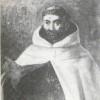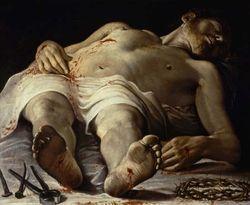All Activity
- Today
-
“ Jesus came and stood among them.” Anywhere else in the Gospel story and this would not be a strange statement. Yet this time was different. This time, the presence of Jesus in the midst of his disciples was not only unexpected, but it was seemingly impossible. It might be difficult for us to imagine ourselves in the place of the disciples. How many of us have risked our lives for something that we believe in or followed after? To be seriously threatened for our beliefs? In the midst of their fear, Jesus came and stood among his disciples. Jesus, the one whom they believed was not only their Messiah but their friend, was alive and standing in their midst. What great reversal, beyond the bounds of possibility, had occurred in the natural order of things? Jesus must have sensed their bewilderment. The first words he spoke to his friends were “Peace be with you,” reassuring them that his presence in their midst was not an illusion or hallucination. Their belief was not misplaced. Their hopes had been resurrected with Christ. Jesus, again, repeats, “Peace be with you,” and then continuing, “As the Father has sent me, so I send you.” Put plainly, Jesus tells the disciples His story isn’t over, and because of this, their story wasn’t over yet either. This was always the plan, and the next step would require them to go out into the world and share the good news of the Resurrection with everyone. While disbelief had to have been at least one of the expected outcomes, they probably didn’t expect it to be the response of one of their own. Yet the next line in our passage reveals that Thomas, one of the twelve disciples, had not been present with the others when Jesus came and stood in their midst. While the other disciples had witnessed and come to believe in the resurrected Jesus, Thomas could not bring himself to believe without also seeing Jesus for himself. Thomas often gets a bad rap, but I am reminded of the words of Francis Bacon, the English philosopher, who stated in The Advancement of Learning, “If a man will begin with certainties, he shall end in doubts; but if he will be content to begin with doubts he shall end in certainties.” Perhaps Thomas understood this when he said, “ Unless I see the holes that the nails made in his hands and can put my finger into the holes they made, and unless I can put my hand into his side, I refuse to believe.” Thomas knew what had happened to his friend and Messiah. He, like the other disciples, had carried the weight of fear and doubt that came from having his hopes dashed. He had not seen the resurrected Jesus as the others had and he would not be satisfied until he had seen him with his own eyes. He would take no one’s word for it. I cannot blame him. Can you? Who among us would not have responded in a similar fashion? A week later, the disciples were gathered together again in the same house. Only this time, Thomas was with them. Once again, Jesus came and stood in the midst of his disciples. He greeted them again, saying, “Peace be with you,” before turning and addressing Thomas directly. He said, “ Put your finger here; look, here are my hands. Give me your hand; put it into my side. Doubt no longer but believe.” The Greek word we translate to “doubt” is ἄπιστος (apistos), which means unfaithful, faithless or unbelieving, without trust in God. Jesus is touching on something deeper here than Thomas simply doubting that the person of Jesus was no longer dead and had resurrected. Jesus was touching on Thomas’ belief or lack of belief in the God who had sent Jesus into the world and who was capable of resurrecting not only Jesus, but the entire creation. Jesus’ words, “ Doubt no longer but believe,” are aimed not only at Thomas, but also at all those who encounter this passage, and are struggling to believe that God is able to do the thing which God has promised—call our world into new and unending, resurrected life. Thomas responds, saying, “My Lord and my God!” This too should be our response, as we so often find ourselves in Thomas’ shoes, struggling to believe and remain faithful when the world around us often seems hellbent on its own destruction rather than resurrection and new life. Jesus responds with all future generations, including us, in mind, saying, ‘You believe because you can see me. Happy are those who have not seen and yet believe.’ Because what other choice do we have? We believe not because we have seen his wounds or placed our hands within his side, but because we have seen Christ in the face of another. It is in gathering together that Christ is made known. Jesus continues to stand among his disciples, beckoning us to believe not only in his resurrection but also in our own and in the resurrection of the whole world.
- Yesterday
-

Congregation of the Sister-Servants of the Holy Spirit of Perpetual Adoration (Latin: Servarum Spiritus Sancti de Adoratione Perpetua, SSpSAP
graciandelamadrededios replied to graciandelamadrededios's topic in Catholic Vocation Station
For the first time, our Blessed Sacrament Convent in Baguio hosted our Congregation's International Superiors Assembly from January 20 to February 8. Before going to Baguio, the superiors, with Mother Maria Magdalena and Generalate Councilor, Sister Maria Raquel, went to Lipa to visit the Convento del Divino Amor, the cradle of our Congregation in the Philippines 100 years ago. They had lunch with the Redemptorist Fathers who have since taken over the Convent. Their next stop was Tagaytay City, to visit our Convent, particularly our new Way of the Cross. On the formal invitation of Fr. Sam Agcaracar, SVD, Rector of the Divine Word Seminary, they went to visit the vast and well-developed SVD Laudato Si Farm, with its vegetable and ornamental plant gardens, fishpond, restaurant and cafe as well as quiet spots for prayer and renewal, and the beautiful Chapel of the Virgin of the Poor. Late in the afternoon, our guests left for our St. Joseph's Convent in Quezon City, en route to Baguio the following day. From the Pink Sister's newsletter - WELLSPRING - Last week
-

Trad wife movement vs working wives
little2add replied to Anastasia13's topic in Catholic Debate Table
In today's day and age, it is nearly impossible for a family to survive on one paycheck, granted. I myself raise my three children on my single income and my wife stayed home and made many sacrifices. We didn't have money for our Kids college tuition or new clothes or vacation to Disneyland like all my friends and neighbors but we got by. In the last 20 years, it's become much more difficult to live (support a family) , virtually all my family and neighbors, friends need two paychecks. Losing a spouse is a tremendous burden and money (or lack thereof) is only a small part of the pain. -

Trad wife movement vs working wives
Anastasia13 replied to Anastasia13's topic in Catholic Debate Table
I found TinyTherese to be more reasonable and honestly agree a bit with her in that point. I say that with my nativity based in having almost been a widow and being privileged upper middle class near relatives. -

Trad wife movement vs working wives
little2add replied to Anastasia13's topic in Catholic Debate Table
In your opinion, my thoughts about this subject are beyond your understanding. They are, however, relevant ( in my humble opinion,) you on the other hand,, be slightly naïve about this subject, no offense -

Trad wife movement vs working wives
little2add replied to Anastasia13's topic in Catholic Debate Table
foster care with relatives was done in the past. -

Trad wife movement vs working wives
Anastasia13 replied to Anastasia13's topic in Catholic Debate Table
And what could she do to make that easier should she find herself as a widow with young children? Is that something that women should be considering when choosing how to be at home? (I am posting on the assumption that there are things between being a full trad wife making homemade cereal every morning and being a career-driven mom who is barely at home). -

ROME (AP) — Pope Francis is in critical condition
little2add replied to little2add's topic in Catholic Open Mic
-

Our Lady-Of-Guadalupe And Franciscan Friar Bishop Juan-De-Zumarraga
Francis Coffee posted a topic in Catholic Open Mic
The story of Our Lady of Guadalupe is deeply intertwined with Bishop Juan de Zumárraga, OFM. That a follower of St. Francis of Assisi be the first bishop of Mexico and chosen to assist 0ur Blessed Mother is no coincidence. https://fscc-calledtobe.org/2024/12/10/franciscan-moment-our-lady-of-guadalupe-and-franciscan-friar-juan-de-zumarraga/ -

Trad wife movement vs working wives
little2add replied to Anastasia13's topic in Catholic Debate Table
yes -

ROME (AP) — Pope Francis is in critical condition
little2add replied to little2add's topic in Catholic Open Mic
"Dearest brothers and sisters, with deep sorrow I must announce the death of our Holy Father Francis. At 7:35 this morning, the Bishop of Rome, Francis, returned to the house of the Father. His entire life was dedicated to the service of the Lord and of His Church. He taught us to live the values of the Gospel with fidelity, courage, and universal love, especially in favor of the poorest and most marginalized. With immense gratitude for his example as a true disciple of the Lord Jesus, we commend the soul of Pope Francis to the infinite merciful love of the One and Triune God." Cardinal Kevin Farrell, Camerlengo of the Apostolic Chamber -

Trad wife movement vs working wives
tinytherese replied to Anastasia13's topic in Catholic Debate Table
Yes, prayer is good. No one in this thread is questioning that. Several of us are confused about your posts that make irrelevant points about the topic of wives having careers. The question is "If stay at home mom has a husband who dies should she get a job to support herself and her children?" -
Darkness still hides the coming dawn as Mary Magdalene ventures out to Jesus’ tomb. What she sees shakes this fearless follower of Jesus to her marrow. She discovers that the massive stone set in place to seal his tomb has been removed. Mary has no thoughts of resurrection. An empty tomb is frightening when you don’t know what happened to the body of the deceased. Mary Magdalene was so bewildered by the empty tomb that she went for help and soon Simon Peter and John were literally racing to the tomb. John arrived first to see the linen wrappings without pushing into the tomb itself. Peter goes inside and discovers the linen wrappings, with the head cloth rolled up and set in a place by itself. John’s Gospel shows how the light of the glory of what God had done in raising Jesus was slow to dawn on his followers. This lack of recognition reveals the way despair clouds our vision and hinders us from seeing correctly. It takes time for the eyes of their hearts to adjust to this new light. Peter and John return home. Only Mary Magdalene remains. Notice that the anguish the disciples endured was warranted. We find that despair is the natural reaction to seeing the fallen world as it is. We see all the effects of our sin and disobedience to God’s will. We see the painful divisions that we humans have collectively created. Despair is what arises in our spirits when we look realistically at this situation but do so without hope in a God who acts in human history. Hope sees the world from the godly perspective, knowing that all we see is not all that there is. We see this shift in perspective as first Mary Magdalene and then the rest of Jesus’ followers will come to experience Jesus anew after his resurrection. Then after the coming of the Holy Spirit fifty days later at Pentecost, they would be astounded to see how people who never knew Jesus when he was alive, came to experience him as they did. And for us as well, the real proof of the resurrection comes not just in a story of something that happened long ago, but also in our own experience of God’s presence. This is something way more reliable than your feelings. For you should know that you will not always feel Christ in and with you, yet in looking back over difficult times, we can see how God was with us. You can know if the peace was beyond you or if the healing or the sense of release with forgiveness comes from God. We see in Jesus’ crucifixion, how far the love of God extends, to never give up on that love, even when it means death on a cross. God, the Holy Trinity, who made us out of love. Our transcendent God entered into this world in the person of Jesus, to redeem us through his passion, death, resurrection, and ascension. In the resurrection, we discover how good defeats evil and love conquers hate. On Easter Sunday, the empty tomb conveys the joy of hope and new opportunities. If Jesus can overcome death, what else is possible? Easter is certainly a time for revival. A time when we can reclaim the promise of a new life in Christ, who said, “I came that they may have life, and have it abundantly”. It is another chance to start again, to trust in the God who made us and who loves us. This is a time when we can ask God “What do you want me to do with my life?” You may receive an answer that will surprise you! Christ is Risen. Alleluia. Have a truly blessed Easter.
-

Trad wife movement vs working wives
little2add replied to Anastasia13's topic in Catholic Debate Table
If I passed away there isn't a much I could do? If I was a surviving spouse, I would pray! - Earlier
-
On that first Saturday, those who are keeping vigil after the most terrible loss imaginable do not have a strong belief in resurrection. After Jesus was taken down from the cross and furtively wrapped in borrowed linen and placed in Joseph’s unused tomb, those who had loved him were left without hope. The men who had lived with him during his public ministry, frightened and cowed, went into hiding. The vigil was left to the women, for this is what women did and continue to do. The same women now stood near the tomb that hid him, waiting to offer him the rites prescribed by their tradition. The burial had been hasty; he deserved better than that. However, “Something strange is happening – there is a great silence on earth today, a great silence and stillness. The whole earth keeps silence because the King is asleep…” So begins an ancient homily for Holy Saturday. The text dates to the 4th century and was written in Greek; the author is unknown. In it he describes Christ’s descent to the dead, where he grasps Adam and Eve and frees them from sorrow: “He (Christ) took [Adam] by the hand and raised him up, saying: ‘Awake, O sleeper, and rise from the dead, and Christ will give you light… I did not create you to be a prisoner in hell. Rise from the dead, for I am the life of the dead. Rise up, work of my hands, you who were created in my image. Rise, let us leave this place, for you are in my and I am in you; together we form only one person and we cannot be separated.’” We stand in the middle of the great Triduum, the three great days of our Lord’s work. These three days are the holiest of days. What happened on these days long ago are the only events that ever truly changed the world. And today we find ourselves living once again in the Day of Silence. Living on the boundary between Good Friday and Holy Easter, we find ourselves stopped for a moment, to tread water with Christ in his being-dead for us. Today we are stopped in our tracks by the narrative of death and burial. On Holy Saturday, God proves that there is no abyss of sin and godlessness that he cannot descend into. The depths of God’s love run every bit as deep as the depths of sin and death which we unleash upon the world. And tomorrow we will learn that the depths of God’s love run infinitely deeper than the abyss of sin…but we’re not there yet. When we look at the God of Holy Saturday, the Trinitarian, cruciform God and ask ourselves how we might possibly image this kind of love, we find ourselves drawn into God’s loving descent into the depths of our sin for our salvation. When we say that we, as the church are the image of the Trinity, we are making the daring statement that we are joining in the pattern of Christ, in giving ourselves away, in expending ourselves for other, in putting others before ourselves, in loving others even to the point of death for their sake. This is what the life of the Trinity looks like when translated into the life of the sinful world. And so, as we seek to live and be the body of Christ, the one who descended into hell for us, his body lying cold in the grave, let us with humility and sobriety remember the horrifically great cost of love. God’s love for us cost him what was most precious to him, his own Son. If we would follow God, if we would be the ikon of his love in the world, the same pattern of self-giving must be true of us. We must, if we seek to follow God, descend into the world of sin and suffering and expend our love on all the unlovely people that we meet. And, as with Christ it may mean our death. But here is the miracle of Holy Saturday: Because Christ has died our death for us, we are never alone in death. “For this reason, Christ died and lived again, that he might be the Lord of both the dead and the living.”
-

Carmelite Monastery, Schenectady, NY = letters
graciandelamadrededios posted a topic in Catholic Vocation Station
CARMELITE MONASTERY 428 DUANE AVENUE SCHENECDATY, N.Y. 12304-2628 J.M. + J.T March 11, 2005 Our dear, dear Friends, Praised be Jesus Christ! As we approach the Solemnity of St. Joseph, we wish you many blessings from his powerful intercession. As you know St. Teresa said he never refused her any favor she asked of him, and we are praying for each of you in particular in our novena before his feast. Most of you know of our need to relocate our community. For Many reasons we have been advised to move from Duane Avenue, our home for over eighty years, and to look for a place that is in a more contemplative environment. And many of you have been praying with us to St. Joseph for this intention. During the past few weeks, a totally unexpected turn of events has unfolded and we want to share with you how St. Joseph seems to be answering our prayers. We have been working for two years in our search for a new place in the diocese, and every avenue has led to a "dead-end." We do not want to pay five million dollars for a new building for eleven sisters, especially as it would require a great fund-raising appeal. Last year we were informed that our Carmelite Sisters in Pittsford, New York (Diocese of Rochester) had passed "the point of no return." Three of the Sisters needed nursing care and the other three could not maintain community life. They were welcomed by the Sisters of St. Joseph of Rochester and now reside in their new motherhouse. The Pittsford monastery was put up for sale. It is a beautiful stone building on fifty-eight acres of land. We were invited to consider moving there, but at that time the distance and the price (3.6 million dollars) discouraged us. Last month the Prioress of Pittsford Carmel contacted us. The contractor who was to purchase their property backed out at the last minute, saying he could not finance the project he had in mind. The Sisters realized that they do not want the monastery to be torn down (this was his plan), nor do they wish it to be given to secular purposes. Their solution is to offer it to us at no cost. A couple of us went to see it and to take pictures. The monastery is a real "jewel." The architect who designed it went to Spain to study monasteries there before he began his work. The chapel reminds one of a Cistercian abbey church in miniature (it seats 60 - 70 persons) and our present sanctuary furnishings will fit quite well. The slate roof of the whole complex was completely renewed two or three years ago, and the building has been insulated. It seems large, but in actual fact it is eleven thousand square feet smaller than our present building. With this letter we are sending some pictures so that you can see something of what is being offered to us. We ask you to pray with us as we discern God's will in this matter. Our hearts are heavy as we think of leaving this diocese, though in fact, our hearts will always remain here. Diocesan boundaries are man-made, and our love and prayers would still reach you and yours will reach us. At one time the whole New York State was one Diocese. Another significant factor is that the chaplains of the monastery in Pittsford are Priests of the Congregation of St. Basil. Here we have always been dependent on the diocesan clergy, and we are less and less certain of having a priest of Mass as the responsibilities of our good parish Priests increase. This is where we are at present. We would have liked to speak to each one of your in person, but since this is not possible, a letter sent to all at the same time seemed the next best thing. The plans are not finalized. The comment of one of our Priests was, "The news is bitter-sweet... but how could you refuse such offer?" So, we pray, and ask you to pray, as we ask ourselves this question. This year the feast of St. Joseph marks the beginning of Holy Week. As we enter into the liturgical celebration of the greatest Mysteries, we beg that God's grace in super-abundance may flood your hearts and minds. Devotedly yours, in Our Lord and His Mother, The Carmelite Sisters -
J1.6 Je vous salut Marie, pleine de grâce, le Seigneur est avec vous, vous êtes bénie entres toutes les femmes et Jésus, le fruit de vos entrailles est béni. Sainte Marie, Mère de Dieu, priez pour nous pécheurs, maintenant et a l'heure de notre mort. Amen
-

Trad wife movement vs working wives
Norseman82 replied to Anastasia13's topic in Catholic Debate Table
But what if it were YOU who had passed away leaving behind your wife and three children while they were still young (say pre-teens)? -

Trad wife movement vs working wives
little2add replied to Anastasia13's topic in Catholic Debate Table
Motherhood is a career. No one (including myself) in this thread is saying that having a career is bad, either. In fact, nearly all the families with children (I know) today, both spouses have to work in order to make ends meet. What are boils down to , is priorities and the quality of your life? -
Today, on Good Friday, we are asked not to look ahead to Sunday, but to sit here, at the foot of the cross. At the entrance to a grave. Today, we have to do what we do throughout life when beloved people die; we are asked to walk away in sadness. Let’s not skip ahead. Good Friday has something to teach us. The disciples did not know that Sunday would bring relief. The disciples did not know that Jesus would be resurrected. The disciples did not know that there was any hope. They walked away in sadness. They hid in fear. The disciples sat where we sit when someone we love dies. Because it is common knowledge that when people die, they typically do not come back to us in three days. As much as we would like to avoid it, death is coming for each of us. Death is coming – for each of us and those we love. Good Friday teaches us to look at death, to accept it as reality, to have patience with it. Because Jesus did it first. Good Friday teaches us that when we are at our lowest, God is there. Good Friday teaches us that when we suffer, God is there. Good Friday teaches us that when we all inevitably face the reality that is death, God is there. God has been there. God will be there. Even in the depths of the grave. Good Friday teaches us that there is no grave that we could go into — literally or figuratively — in which God cannot reach us. In the gospel text for the day, we hear the story of Jesus’ death as told by John. While the other gospels feature miraculous happenings when Jesus dies, like tombs being opened or the curtain of the Temple being torn in two, in John, we do not hear of those. For whatever reason, the evangelist does not choose to feature those occurrences. Because it is generally accepted that John was the last gospel to be written, we can safely assume that the fourth evangelist knew about them, but they are simply not featured in his writing. No, instead, in John’s gospel, Jesus simply breathes his last. Jesus simply dies. Fittingly, for a gospel in which Jesus is the love of God made flesh for the sake of the world, Jesus simply dies the death of a human. Just like us. Also fittingly, Jesus does what many people do when they know that they are about to die. He takes care of his friends. He takes care of his mother. He gives the beloved disciple to his mother, and she to him, to care for one another. After he dies, we meet a character that we also met in chapter 3 of John: Nicodemus. Nicodemus was a Pharisee who first came to Jesus by night. It was to Nicodemus that Jesus said his famous words in John 3:16:“For God so loved the world that he gave his only Son, so that everyone who believes in him may not perish but have eternal life.” After Jesus dies, Nicodemus shows that Jesus’ words that night had an impact. Nicodemus and Joseph of Arimathea show up to collect Jesus’ body and bury him. Yes, we know the end of the story. We know that Jesus will be resurrected. We know that Sunday is coming. But on Good Friday, we are asked to forget that we know the ending. We are asked to sit with death and accept its reality because God endured death first. Good Friday reminds us, every single year, that death is a reality that we must face, but that we need not be afraid because Jesus has endured it first. We are finite, our lives are temporary. We embrace the hope of Good Friday: That while death is the worst thing, the hope we have in Jesus is that the worst thing is never the last thing. We are dust, we are mortal, and we are bound for the grave. But the Good news, is that Jesus has gone before us to the grave. And where Jesus is, there is hope – on Good Friday and forever.
-
J1.5 Je vous salut Marie, pleine de grâce, le Seigneur est avec vous, vous êtes bénie entres toutes les femmes et Jésus, le fruit de vos entrailles est béni. Sainte Marie, Mère de Dieu, priez pour nous pécheurs, maintenant et a l'heure de notre mort. Amen
-

Trad wife movement vs working wives
tinytherese replied to Anastasia13's topic in Catholic Debate Table
I still don't understand. Unmarried women get pregnant. This makes husbands die for some reason. So in conclusion, wives shouldn't have careers in case their husbands die. I don't see any logic in these claims. No one in this thread is saying that marriage is bad. What we're debating is whether wives should be able to have careers. Someone brought up that not having a career is a problem if a woman's husband dies. How will she financially support herself and any children? -

Trad wife movement vs working wives
little2add replied to Anastasia13's topic in Catholic Debate Table
Everything! Life is a struggle, no matter what your status in life is. Single, married, divorced or separated, rich or poor. Life's a beesh and then you die. My spouse had my back and I had hers, we lived paycheck to paycheck and raised three beautiful children. My spouse passed away, sometime ago, and I have never been the same if it wasn't for my children and grandchildren, I would have surely died from despair. I feel that at least in my case, holy matrimony truly saved my life. BTW: my spouse was a SAHM -

POOR CLARE FEDERATION OF MARY IMMACULATE - PCC AND OSC
graciandelamadrededios replied to graciandelamadrededios's topic in Catholic Vocation Station
POOR CLARE FEDERATION OF MARY IMMACULATE June 8, 1959 Pope John XXIII granted the petition of the Poor Clare Nuns of St. Colette in the United States of America to form a federation among themselves. The charter member monasteries of the Federation are: Blessed Sacrament Monastery, Cleveland, Ohio (founded from Dusseldorf, Germany, 1877); Monastery of the Immaculate Conception, Chicago, Illinois (founded from Cleveland, 1893); Maria Regina Mater Monastery, Kokomo, Indiana (founded from Chicago, 1959); St. Joseph's Monastery, Aptos, California (founded from Cleveland, 1921); Monastery of Our Lady of Guadalupe, Roswell, New Mexico (founded from Chicago, 1948); Bethlehem Monastery, Newport News, Virginia (founded from Cleveland, 1956), relocated to Barhamsville, Virginia in 2004. -

The Vowed Life: Focus of Formation for New Sisters
Francis Coffee posted a topic in Catholic Vocation Station
The weekend held many blessings for Sister Concepción Medina, Sister Catherine Peter Logan, Sister Michelle Marie Ozuna and Cyan Reed.... https://fscc-calledtobe.org/2025/04/15/the-vowed-life-focus-of-manitowoc-formation-weekend/ The first full day of Formation Weekend started in St. Francis chapel with morning prayer followed by Mass for the intentions of all of those in formation. Father Joachim Studwell, OFM, the speaker for the weekend, was the presider at Mass. Following Mass, we heard Father Kim’s first talk titled, The Vow of Poverty – Depending on the Lord. Father Kim provided historical information about the evolution of our faith and the rich history of Christian faithful who have tried to live a privileged life of poverty. He explained that to undertake poverty is a grieving process and we should ask ourselves, “What am I letting go of, what am I clinging to, and what does it symbolize?”




